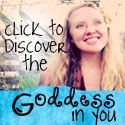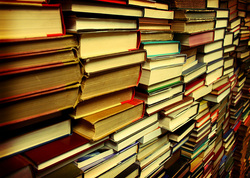 When I was searching through Tarot articles for new information to share with you guys, I stumbled on something that really made me twitchy. In one article geared towards learning to read the cards for beginners, I saw an author saying it might be too confusing for a beginner to read multiple books on the cards, because it might lead to conflicting meanings.
And my first thought was: so what?
Here's the thing about Tarot meanings - they evolve, based on the reader, the deck, the author, the school of thought, the time of the writing. Saying that "conflicting ideas" will confuse you is like saying there's a right answer in the first place. But worst of all, it's like saying you can know too much.
I'm a bookworm and, showing my nerdy roots again, a Ravenclaw at heart. I can't think of anything you could possibly read too much on. You should always, always strive to learn as much as possible - or you'll get locked into one meaning, and unable to be flexible when the need serves. When you're reading for yourself or for someone else, you'll find a meaning for the cards that just doesn't fit the rest of the reading, unless you're willing to think outside the box a little bit or go with your gut. Saying that's "too confusing" is like assuming you can't think hard enough to read the cards in the first place.
There are things to watch out for, of course. Don't scatter your energies and try to tackle too many books at once without absorbing all of them. Don't take anything as gospel without examining why one author feels one way, and another might feel a different way. Don't fail to recognize real, historical facts, because Tarot's genuine evidence-based history shows a lot about where it came from and helps you appreciate how it evolved.
But there's never too much information. There are only ineffective ways of absorbing it.
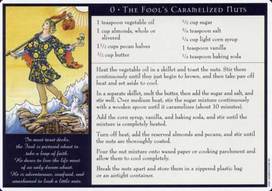 One of the many awesome things about Tarot is just how diverse it is. Even when a lot of what's out there is copying the familiar images of the Rider-Waite Tarot, its variations are like giving a new spin to a familiar friend. And when Tarot does step out of that box? There's a whole list of things you can discover. Here's a few on my wishlist. - Astrology. The Golden Dawn and other esoteric organizations found that with a tiny bit of wiggling, Tarot corresponds to astrology and makes a pretty excellent teaching tool. The Celestial Tarot talks about those direct associations, and has some really gorgeous art to help you learn a little about Tarot and the stars.
- Crystals and Herbs. Magickal types love associations, so I'm going to give you a two-for-one here. The Crystal Tarot links Tarot to gemstone therapy, and if you want to learn herbcraft, there's a Tarot for that too.
- Fairy Tales and Myths. Modern Tarot interpretations are all about archetypes, and there are some universal archetypes - and some that change based on the time and nation of the telling. Fairy tales? Here, have two decks with tales from all over the world. Religion and mythology? (To be inclusive, let's say one man's myth is another man's gospel.) Arthurian, Celtic, Christian, Greek, Egyptian, Norse, even a well-researched deck about several Native American tribes, the Tarot runs the gamut.
- Recipes. There are two different decks that create recipes based on the cards, one with just the Major Arcana and one with 78 different recipes for an entire deck. And as a bonus? A deck that tells the entire history of chocolate. I'm pretty sure that's something I never knew I always wanted.
- Science. I'm pretty useless when it comes to science and math, but the Quantum Tarot somehow combines Tarot with quantum physics, and that is pretty damn awesome.
Did I leave out any of your favorites? Anything on the same subject with better research? Leave me a comment, I'd love to hear from you!
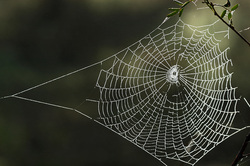 It's nearly a year ago to date. Attending a Lammas celebration, I go to a Tarot reader participating in the festival. She gives me a lot of wonderful advice about the new direction my life is moving towards, and the evolution I'm about to go through. She rightly tells me that in just six months, my entire outlook on life will be different.
She then speaks in extensive warnings about the man who will enter my life that I shouldn't trust with my heart, as he's just looking for a handout. She explains that I'll then meet a man I slowly grow closer to, and enter a more serious relationship with him.
I don't remember the exact details because at that point I had zoned out - when I wasn't exchanging glances with my long-time girlfriend of eight years, who was sitting on the chair right next to me.
As it happens, we did experience a period of growing much closer right around the timestamp this reader gave me. And some male friends were involved, but not in the way the reader said. It's not that this person was completely inaccurate in terms of my reading. She wasn't dead-on, but if you thought outside the box some of her advice was invaluable. But right away she'd made some assumptions about who I was and what I wanted out of life. And that was where she'd lost me.
It's not that this person was homophobic, or a bad person in any way. Really, any time we fail to be inclusive, we're a product of our environment. Ignoring the way our whole society focuses on one kind of person: how many decks that aren't made specifically for gay men feature a heterosexual Lovers card? How many genderqueer or trans people can you find in any Tarot deck? People over a certain weight? People who aren't white, which is thankfully becoming less of a problem, but I still see decks where there's not a single brown, black, or Asian face to be found.
Hell, you could even argue that the very construction of a Tarot deck - the quiet, intuitive High Priestess and the motherly Empress, the power-wielding Emperor and forceful Magician - is rooted in a certain set of gender roles. And Tarot came from the 15th century, so that's to be expected. But when do we challenge that, and what does it do to our preconceived ideas?
When you read for strangers, even if you're divining their lives, it's important to not assume the way those lives work. Even if we're not licensed therapists, a lot of us consider ourselves to be in service positions. That means we're meant to illuminate and empower the lives of our clients - and we can hardly do that when we don't realize a client is in a poly relationship, or asexual, or only feels female some of the time. It's not really our business to ask, but it's our job to know that these are possibilities - and that if we're operating in the web of life, sometimes there are strands we never even imagined we'd land on.
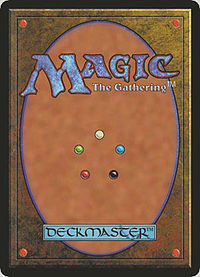 You know how some people get brilliant flashes of inspiration in the shower? My completely un-brilliant flash went like this:
By all evidence, history shows us that Tarot originated in the mid-15th century as a card game called tarocchi. Each card in the Major Arcana represented a different rule that applied to the actual game. There's a lot of discussion about whether the Tarot also hid certain pagan ideas (unlikely, since earlier decks were very medieval Christian), or was used in teaching religious allegory to kids. But as far as history suggests, Tarot became used for divination because a lot of things are used for divination: tea leaves, entrails, playing cards (a method that pre-dates Tarot cards as a game or an oracle, I believe).
Now, this doesn't overturn Tarot's legitimacy one bit. First of all, Tarot spoke to people as a teaching tool and an oracle because it works with archetypes, very universal figures and ideas. The images were inspiring, and really that's all divination takes: taking a look at something as a lens through which you view your life and your future. You can divine using toothpicks, coins, or clouds, so long as you have a consistent meaning attached to them. The magic is in you and in the Universe. Tarot is just a very creatively inspiring tool, one that happened to link up very easily to a lot of pre-existing ideas, and became a very effective method for teaching them.
So effective, in fact, that Tarot's popularity as an oracle grew in the 1800s, when a man named Antoine Court de Gebelin was convinced that Tarot originated in Egypt and represented Egyptian mysteries. He wrote a paper alleging a lot of connections, and others picked up on it. (Scholarship was like that a lot, back then, and Egypt fever was alive and well.) And the idea that Tarot came from Egypt, and even Atlantis, survives to today.
Now, my grand revelation? Tarot started out as a card game with a series of characters that can alter the rules of what each player is allowed to do. And amazingly, we have card games like this all the time today, mainly in the form of trading cards. Pokemon has a card game similar to this, and an American version is Magic: The Gathering. And my absolute favorite weird bit of synchronicity? A card game from Japan called Yu-Gi-Oh, where the game's fictional mythos is that it was originally played in Egypt, commanding real magickal forces, and slowly evolved into a children's game years into the future.
In some ways, Tarot is a reverse-engineered Yu-Gi-Oh - a game my now-adult brother played a lot as a kid. When I informed him of this connection, he burst out laughing. And then, after a pause, he added: "History is weird."
I had to agree.
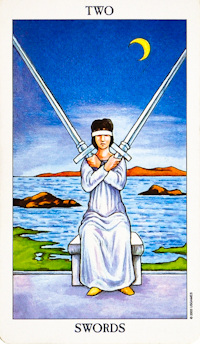 When you're first starting out while reading Tarot cards, there's a tendency to second-guess yourself. I can still remember all the things I used to say to myself in the beginning. "I haven't shuffled enough, that's why this card keeps reappearing." "There's too many reversals for this to really be accurate." "I really need to learn to shuffle better, a card just flew out from the deck mid-way through. Now I can't possibly draw it or it's a biased reading in some way." Here's the thing: in Tarot, there aren't really mistakes.I'm not saying you can't give a bad reading. And not everyone's going to agree with me - I remember Dan Pelletier's "The Process" saying that once a card flies out of a deck during shuffling, "you've lost all credibility with your sitter," and I can understand exactly why he'd say so. But I also remember The Devil practically shooting out from my hand during one shuffling. And I proceeded to lay it on the table, and ask if addiction had recently come into play for my sitter. As it turned out, her son was in prison for some of the things he'd done while on drugs. I pay attention to the cards that shoot out of my hand as additions to the reading now, and it never fails. Repeating cards? Those are a capital-M Message for you, one you need to really grasp the meaning of when they show up. They'll haunt you across multiple decks until you really figure it out. Too many reversals? Maybe see reversals in a different light for this reading - as cards that are blocked/scattered energy, or energies you need to pay attention to. Ask three Tarot readers and get five different answers. But the important thing here is that Tarot reflects what's going on in the world, and inside you, so it's a beautifully adaptable tool to whatever might happen. What's important is really your reaction, the connections you make. Your mistakes might tell you more about your question than a reading that's perfect, smooth sailing. Agree? Disagree? I'd love to hear your personal interpretation of events like these in the comments!
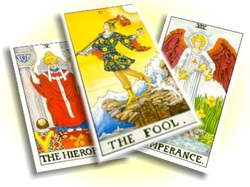 Everywhere you go, it seems like there are different Tarot readers with different styles and approaches. And there's a ton of information about the cards on the Internet, with a lot of different approaches and ideas. It's a bit easy to get caught down the rabbit hole when you're getting started. Here are five of my favorite Tarot resources that I use over and over again, all of which are really great for beginners - but can also provide some new ground to cover for experts, too. Aeclectic.net - If you want to review a deck before you buy it, this is place to go. There are thousands of decks sorted by categories, types, trends, and even the top-voted decks for each year. The site also has a really big, popular forum that can be overwhelming at first, but has a ton of information on pretty much everything Tarot you can think of - and takes a look at oracle and Leormand decks, too. Facade.com - Online Tarot readings work just as well as the in-person kind, and this site offers the biggest variety of decks and spreads I know to give incredibly detailed Tarot readings. The site also provides readings for runes, I Ching, biorhythms, and more. It's easy to spend hours there! Learntarot.com - This is one of the main sites I used to learn Tarot, and it's still one of the most comprehensive sets of free beginner lessons I know. Joan Bunning provides helpful exercises, great insight, and useful sets of keywords for each card. The only problem with this and any Tarot site is it's easy to get caught up in one author's version of keywords, and not explore the full complexity of what the Tarot has to offer. Make sure you keep things diverse! Masqued Man's Tarot Bible - Sadly there isn't really a hub page for this awesome resource, so I've got to start you with his page for the Magician. But this site shows comparative images from hundreds of different Tarot decks, spread across the entire deck. It's great for looking before you buy, and also for comparing different ideas and symbols across the various decks, deepening your understanding of each card. (I have to confess, I'm not sure how copyright works for the images this site uses, or if it does. So if that worries you, by all means, don't visit. But it's out there, it's free, and I've found its resources make me a better reader - and more likely to buy a deck because I know I'm going to love it.) Tarotguild.com - The Tarot Guild is the best site for Tarot professionals I know. It has tons of great podcasts, classes, and resources for both students who want to learn, and professional readers who want a boost in their businesses. There are classes exclusively on social media, which is a huge part of online Tarot these days, and there's an Endorsed Readers Program where you can work for the guild in providing readings for pay. It's taught me so much in the time I've been a member, and while there's a fee for membership, it's very reasonable. And the podcasts are all free! Sorry I'm not really tackling individual readers here, but I wanted to keep this as more of a learning resource. What are some of your favorite Tarot sites out there? And yes, you're free to link to your own!
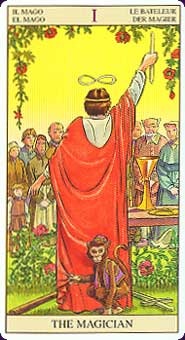 There are hundreds of sites out there talking about how to read Tarot, and how each reader personally sees the cards. Personally, I love them all. They enhance my own insights and style, they make me a better reader.
But there's so much more the cards can do. Italo Calvino's book The Castle of Crossed Destinies has his characters unable to speak, telling their stories purely through Tarot images. The archetypes are so powerful, they can do a lot of speaking for us in the ways we least expect.
Here are five ways Tarot can be turned into a game or a creative tool.
- Cast your favorite characters into roles.
Think of your favorite piece of media - TV shows, movies, books. If they could fit into Tarot cards, who would they be? My nerdy little heart loves to do this with Disney characters, imagining Dumbo as the Fool, Bambi's mother as the Empress, and Doctor Facilier as a wicked, reversed version of The Magician.
- Create a storytelling Round Robin.
You can do this alone or in a group. It's a lot like campfire stories: after shuffling, one person draws a card, and says "There once was...a great and glorious hero, who drove a fearsome Chariot." (Just for an example.) Then the next card drawn continues the story: "One day this hero came across two children, giving each other gifts." See what comes out of the story you tell!
- Have an interview.
This is especially great to do if you're writing a book. Come up with a handful of questions for a character you're writing, and see what cards you draw for each question. Or reverse it - interview one of the Major Arcana about what they have to teach you, or their philosophy on life. You may be surprised at the new depths you find.
- Expand your vision.
One deck I need to get my hands on is the "Tarot of New Vision", a deck that takes familiar images from the Rider-Waite Tarot and turns them 180 degrees, so you can see a new perspective on the card. Imagine what's happening in the cards just offscreen, or behind the figure you see. Or look at one special detail in the cards, and zero in on it. How did the Magician receive his ouroboros sash? What's in the boats the figure in the Two of Wands is looking at? Write a journal entry or a story about it!
The best part of all this: while you use these games and story ideas to have fun, you're also learning to get closer to the cards, and be a better reader! See what new insights open up for you.
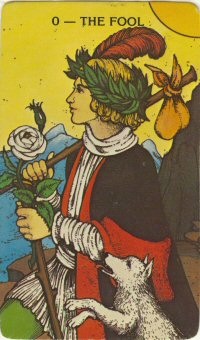 Day 2 of the challenge, and I'm coming in today juuust under the wire, but today has been exhausting. It is roasting out here in Boca Raton, and just a few hours of errands in the heat left me feeling wiped out. But I'm here in all my night owl glory now, hard at work! The card featured here is The Fool from the Morgan-Greer deck, one of my favorite beginner-type decks. The Fool's always been about the Hero's Journey and the quest through life to me, so he seemed only appropriate to include today. Like I said yesterday, I've been working on something really big, which is why I've gone so quiet - but I'm really excited about it, so i want to give a little preview to you all. I think I'm really creating something unique here, and if you're a course junkie like I am, you're going to feel like you've had a really awesome, transformative experience. It's called " Tarot Journeys".Imagine taking a journey through the Major Arcana, card by card, working with the archetypical figures of each card as your mentors. While you explore the in-depth meanings of these cards, you'll get stories, quotes, prompts, Tarot spreads, exercises, and meditations to connect you to each card and establish their places in your life. I want to really show how Tarot can be used as a meditative tool, teaching you the lessons that will make you blossom and thrive. In the first e-course in a series of four, Mentors and Magic Wands, I envision you: - Climbing the Fool's cliff face and talk with him about taking the leap.
- Learning the power of your personal elemental tools with the Magician.
- Developing your intuition with the High Priestess.
- Rediscovering your creativity with the Empress.
- Learning how to own your personal power with the Emperor.
- Finding rituals that support you and breaking harmful traditions with the Heirophant.
Okay, now the plug: the course isn't ready yet. This is a really big project, and my goal is to have everything developed and ready within the next two months. But, if you sign up to my list (and get my awesome free e-book, "Five Ways to Connect With Your Tarot Deck"), you'll get a first look at Tarot Journeys. News about its development through my newsletters, a first look when it premieres, a discount for early subscribers, and a look at an accompanying coaching package that'll really enhance your experience. I am really, really excited about this, and as I'm putting the material together, I keep finding new ways to really bring home the themes of each card and put together a totally new, unique experience. It's going to be fantastic. Let me know what you think of it in the comments! Once again, thanks so much to everyone from the Ultimate Blog Challenge for stopping by. I really loved getting to know some of you yesterday, and I hope we'll all be good friends friends by the time the month is up!
Hello, loyal readers, readers-to-be, and everyone who's taking a look from the Ultimate Blog Challenge, which I'm super excited about and is beginning today!A lot of this blog has been an experimental process up to now - testing different styles and formats, things to talk about, ways to share my thoughts and my skills. I'm taking part in the Ultimate Blog Challenge this month at the fabulous Amethyst Mahoney's suggestion, with the goal of developing writing that's crisper, clearer, and more enjoyable to everyone looking to learn about Tarot and themselves. A little bit about me: my name is Kim DeCina, and I'm a Tarot reader and life coach living in sunny South Florida. I help spiritual seekers and creative types to illuminate the path to their best possible selves, using Tarot cards as the guide. That's why I've chosen to call my work and business "Mirror Moon Tarot" - because to me, Tarot is both a reflective and illuminating process. I've been a bit quiet this month, but that's because I've been hard at work - getting some new skills through training so I can add it to my Masters in Social Work, and put together some awesome life coaching sessions for you all. And I've also been working on writing a brand new project I'm super excited about. I'll tell you more about that tomorrow. Now, to the prettiness: So a huge hello to my new readers. I love everyone who stops by, and I'd love to get to know you all better! Leave a comment at the bottom with a little about you, how you found me, saying hi, a question, whatever. I promise I'll get back to each and every one of you!
 If you ask witchy types what a "Fluffy Bunny" is, you'll get a hundred different answers.
They talk about white light, and the people who hate them are just cynical jerks. They talk about white light, and judge anyone who shows anger or pain. They judge spiritual paths that are too "scary". They're too accepting of just about anything in their spiritual path, without doing the proper research and work. They trust authors that are inaccurate - no one can agree on which authors, mind you, or just what the inaccuracies are .
Really, the only way I made peace with my fear of being a "fluffy bunny" was when I ignored the conversation altogether. Historical accuracy was something I could gauge, so I checked if that was up to snuff, and the rest? Whatever works for you. And it all seemed to, so why should I care?
But a few weeks ago, a conversation popped up about Tarot that brought the whole idea into my thoughts again. The heated debate went: Tarot has been used to teach spiritual mysteries, and has been part of a lot of magickal ceremonies. Now, it's mostly used for "fortune-telling". Has Tarot been turned into a fluffy New-Agey oracle? Has the "real" meaning of things been corrupted somehow?
I mainly rolled my eyes and ignored the whole thing, as more people slowly broke in: intuitive Tarot isn't as "meaningful." Just teaching the symbolism and magickal meanings aren't as "accurate." And my favorite: we all needed to "admit" that intuition wasn't real, was just an element of our imagination, that there's no such thing as psychic development. Only then can we grow spiritually.
And I thought: Seriously, guys? Seriously? You just talked about the names of God and the angelic correspondences to the Tree of Life, and you're an authority on whether something is made up or not? We work with the Platonic elements and robes and magic wands. We discuss the meaning of 78 pieces of artwork printed on card stock. Most people think we're ridiculous.
And even if you don't, and you're the most mainstream Judeo-Christian out there: someone still thinks you're just talking to imaginary friends.
The human mind is so vast, so varied, so full of thoughts and ideas. Patterns and symbols and stories, they're part of how we learn and grow. That's what Tarot is all about: seeing what story the cards tell you, and using it to inform your life and the choices you make. So unless you are flat-out inventing stuff, or appropriating cultures and passing it off as "authentic", your spiritual life? None of my business.
If you want to develop as a psychic, a witch, a Tarot reader, or even just a spiritual person, there are three whole things you have to do:
- Learn as much about what you want to know as possible.
- Practice it.
- Don't be an ass to people who do it differently.
Tarot's a giant spiritual metaphor, a psychic springboard, a set of journaling prompts, the Book of Life, a storytelling kit, a card game, and a set of 78 pieces of artwork. But really, it's a tool. Your magickal, fantastic mind does the work. And that's as it should be.
How do you Tarot? And what are your thoughts about fuzzy little lagomorphs and the hardasses who love them? I'd love to hear your thoughts!
|








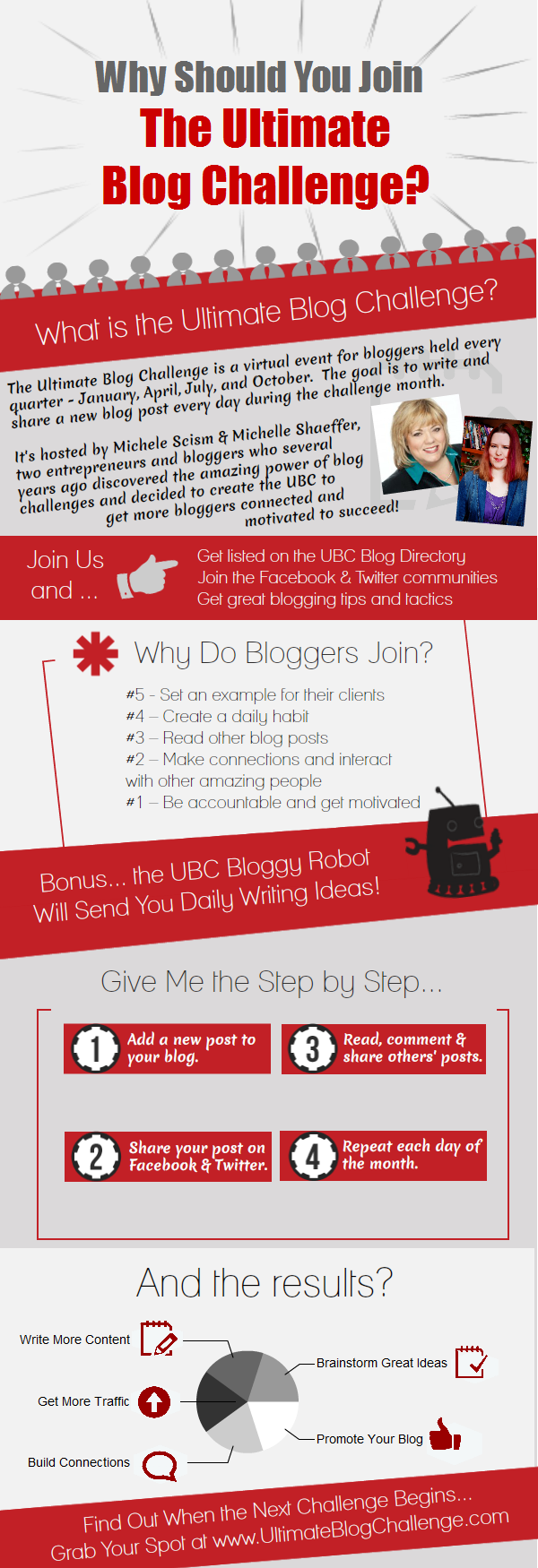

 RSS Feed
RSS Feed
